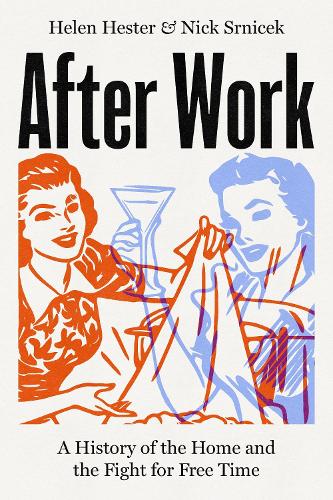
After Work: A History of the Home and the Fight for Free Time
(Paperback)
Publishing Details
After Work: A History of the Home and the Fight for Free Time
By (Author) Helen Hester
By (author) Nick Srnicek
Verso Books
Verso Books
3rd September 2024
United Kingdom
Classifications
General
Non Fiction
Sociology: work and labour
Social welfare and social services
331.4
Physical Properties
Paperback
272
Width 140mm, Height 210mm
350g
Description
The future of work is not coding but caring - high-touch rather than high-tech. The fastest growing jobs revolve around cooking, cleaning and caring. And around half of all work is caring work done unpaid in people's families and homes. But when we think about work, we still tend to think about offices and factories rather than hospitals and homes - the places where care work takes place. If the struggle against work is the struggle for free time, we need to talk about reproductive work. In this groundbreaking book, Hester and Srnicek argue that we must recognise reproductive labour as work, reduce this work as much as possible, and redistribute any remaining work as fairly as possible if we want to value autonomy for all. After Work looks at the history of how reproductive labour took the shape that it does today. Considering the failed promises of labour-saving technologies and the ever-rising expectations of cleanliness and care, and the trajectory of the single-family house as the container of domestic technologies, Hester and Srnicek present a fascinating history of the fight for free time, and new possible terrains for its future-public luxury, temporal sovereignty and family abolition.
Reviews
We are taught to think that there's no alternative to the sad model of social reproduction centered on the single-family home and privatized family. Here's is a practical and creative guide to how we might begin to move beyond that paradigm. -- Kathi Weeks, author of The Problem With Work
Why do breakthroughs of technology so rarely lift the burden of drudgery And how can we harness these breakthroughs to move beyond the capitalist conditions that they service today Following their pioneering theory (Xenofeminism and Inventing the Future) Helen Hester and Nick Srinicek's new book After Work tackles this problem, and provides a new vision of a future that moves us past toil. This book advances the case for "the struggle against work - in all its forms", addressing a broad range of concerns from the rise of platform capitalism to the burdens of care that persistent in private households. Neither understating the scale of the social transformation needed for the planet to survive capitalism, nor lapsing into despair over the thorny trail ahead, After Work is indispensable reading for anyone committed to extending the realm of freedom. -- Jules Gleeson, co-editor of Transgender Marxism
This is an incisive critique of the status quo and an earnest appeal to rethink why people work and how they spend their time. * Publishers Weekly *
Anyone seeking cosy thoughts about the joys of spring cleaning should look elsewhere ... clear and concise, with a lot of learning worn lightly -- Andy Beckett * Guardian *
After Work takes an important look at the implications for the domestic sphere if work is reduced -- Janina Conboye * Financial Times *
A meticulously researched and agilely argued plea for the reduction of domestic labor from feminist scholar Helen Hester and Marxist economist Nick Srnicek. -- Becca Rothfeld * Washington Post *
As a building block for change this splendidly written book makes a most powerful case for the opposition. * Philosophy Football *
After Work will get people talking about their interminable to-do lists. Anyone under 30 who wants to know what their life is going to look like should read it. -- Decca Aitkenhead * Sunday Times *
A dazzling work of applied utopianism -- Enrico Monacelli * The Quietus *
After Work fuses visions for a post-work world with calls to recognise and tackle the crisis in care. -- Holly High * Inside Story *
Interesting and thought-provoking ... If even existing capitalist technologies can give a glimpse of the benefits of a different way of organising society, imagine what would be possible if we had full democratic working-class control of the means of production and a democratic planned economy. -- Christine Thomas * Socialism Today *
Engagingly, After Work focuses not only on how our ideas, culture, and politics might need to evolve to create more free time for caregivers, but also what kind of design and architecture support such changes. -- Liza Featherstone * New York Review of Architecture *
Author Bio
Helen Hester is Head of Film and Media at the University of West London. She is the author of Xenofeminism (Polity, 2018), Beyond Explicit: Pornography and the Displacement of Sex (SUNYPress, 2014), the co-editor of the collections Fat Sex: New Directions in Theory and Activism (Ashgate, 2015) and Dea ex Machina (Merve, 2015), and series editor for Ashgate's 'Sexualities in Society' book series. Her research interests include technofeminism, sexuality studies, and theories of social reproduction, and she is a member of the international feminist collective Laboria Cuboniks (who did The Xenofeminist Manifesto). Nick Srnicek is a Lecturer at City University, author of Platform Capitalism (Polity, 2016),co-author of Inventing the Future (Verso, 2015), and co-editor of The Speculative Turn: Continental Materialism and Realism (Re.press, 2011).
